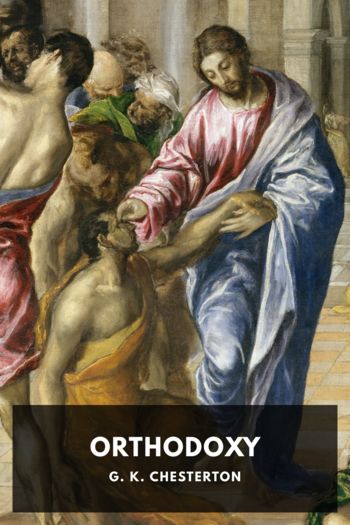Heretics by G. K. Chesterton (best way to read e books TXT) 📕

- Author: G. K. Chesterton
Book online «Heretics by G. K. Chesterton (best way to read e books TXT) 📕». Author G. K. Chesterton
This type of tale, indeed, may be pretty fairly paralleled with the ordinary anecdote terminating in a repartee or an Irish bull. Such a retort as the famous “Je ne vois pas la necessité” we have all seen attributed to Talleyrand, to Voltaire, to Henri Quatre, to an anonymous judge, and so on. But this variety does not in any way make it more likely that the thing was never said at all. It is highly likely that it was really said by somebody unknown. It is highly likely that it was really said by Talleyrand. In any case, it is not any more difficult to believe that the mot might have occurred to a man in conversation than to a man writing memoirs. It might have occurred to any of the men I have mentioned. But there is this point of distinction about it, that it is not likely to have occurred to all of them. And this is where the first class of so-called myth differs from the second to which I have previously referred. For there is a second class of incident found to be common to the stories of five or six heroes, say to Sigurd, to Hercules, to Rustem, to the Cid, and so on. And the peculiarity of this myth is that not only is it highly reasonable to imagine that it really happened to one hero, but it is highly reasonable to imagine that it really happened to all of them. Such a story, for instance, is that of a great man having his strength swayed or thwarted by the mysterious weakness of a woman. The anecdotal story, the story of William Tell, is as I have said, popular, because it is peculiar. But this kind of story, the story of Samson and Delilah, of Arthur and Guinevere, is obviously popular because it is not peculiar. It is popular as good, quiet fiction is popular, because it tells the truth about people. If the ruin of Samson by a woman, and the ruin of Hercules by a woman, have a common legendary origin, it is gratifying to know that we can also explain, as a fable, the ruin of Nelson by a woman and the ruin of Parnell by a woman. And, indeed, I have no doubt whatever that, some centuries hence, the students of folklore will refuse altogether to believe that Elizabeth Barrett eloped with Robert Browning, and will prove their point up to the hilt by the unquestionable fact that the whole fiction of the period was full of such elopements from end to end.
Possibly the most pathetic of all the delusions of the modern students of primitive belief is the notion they have about the thing they call anthropomorphism. They believe that primitive men attributed phenomena to a god in human form in order to explain them, because his mind in its sullen limitation could not reach any further than his own clownish existence. The thunder was called the voice of a man, the lightning the eyes of a man, because by this explanation they were made more reasonable and comfortable. The final cure for all this kind of philosophy is to walk down a lane at night. Anyone who does so will discover very quickly that men pictured something semi-human at the back of all things, not because such a thought was natural, but because it was supernatural; not because it made things more comprehensible, but because it made them a hundred times more incomprehensible and mysterious. For a man walking down a lane at night can see the conspicuous fact that as long as nature keeps to her own course, she has no power with us at all. As long as a tree is a tree, it is a top-heavy monster with a hundred arms, a thousand tongues, and only one leg. But so long as a tree is a tree, it does not frighten us at all. It begins to be something alien, to be something strange, only when it looks like ourselves. When a tree really looks like a man our knees knock under us. And when the whole universe looks like a man we fall on our faces.
XII Paganism and Mr. Lowes DickinsonOf the New Paganism (or neo-Paganism), as it was preached flamboyantly by Mr. Swinburne or delicately by Walter Pater, there is no necessity to take any very grave account, except as a thing which left behind it incomparable exercises in the English language. The New Paganism is no longer new, and it never at any time bore the smallest resemblance to Paganism. The ideas about the ancient civilization which it has left loose in the public mind are certainly extraordinary enough. The term “pagan” is continually used in fiction and light literature as meaning a man without any religion, whereas a pagan was generally a man with about half a dozen. The pagans, according to this notion, were continually crowning themselves with flowers and dancing about in an irresponsible state, whereas, if there were two things that the best pagan civilization did honestly believe in, they were a rather too rigid dignity and a much too rigid responsibility. Pagans are depicted as above all things inebriate and lawless, whereas they





Comments (0)